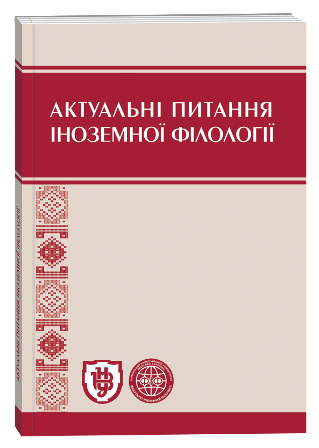МЕТАФОРИЧНЕ ВІДОБРАЖЕННЯ ВІЙНИ В УКРАЇНІ ЛЕКСИЧНИМИ ЗАСОБАМИ (НА МАТЕРІАЛІ ПОЛІТИЧНОГО ДИСКУРСУ)
DOI:
https://doi.org/10.32782/2410-0927-2022-16-12Ключові слова:
метафора, політичний дискурс, наратив, когнітивний процесАнотація
Статтю присвячено метафоричним моделям відображення лексики війни в Україні. Важливість вивчення політичного дискурсу в контексті поточного військового конфлікту в Україні вже давно визнається в широко зрозумілих дослідженнях дискурсу, з багатьма лінгвістичними фокусами, серед яких є метафори. Воєнний дискурс про вторгнення в Україну, який входить до політичного дискурсу містить особливий наратив, який включає різні тематичні елементи в різноманітних синтаксичних конфігураціях, і цивільні особи, у центрі уваги цього поточного аналізу, є частиною цієї картини. У статті висвітлені результати пілотного дослідження, яке було спрямоване на вивчення метафоричного наративу висловлювань про війну. Стаття покликана пролити світло на дискурсивну конструкцію звичайних громадян в дискусіях на форумах. Особлива увага приділялася метафорам, а саме метонімії, пасивності учасників, а також специфічній сентенційній конфігурації, в якій вислови громадян подаються як ґрунт. У статті описано політичний дискурс та його підвид воєнний дискурс у якому вписано метафори емотивності та застосування пересічними громадянами українцями та поляками на форумах. Воєнний наратив представляє собою дискурсивний спосіб ведення війни. Коментарі людей, які дискутують на тему війни зосереджуються на загальних спостереженнях на основі конкретних подій в Україні, де пересічні громадяни є очевидцями основних подій та є постраждалими від воєнних дій. Цей підхід опирається на когнітивну лінгвістичну парадигму, яка має на меті висвітлити основні когнітивні процеси. Емотивність висловлювань громадян двох країн на форумах об’єднана метою визначити у політичному дискурсі, а саме у його підвиді воєнному дискурсі, ключові метафори, які яскраво описують ситуацію в Україні. У статті здійснено спробу виокремити метафору у висловах референтів про події, які зараз відбуваються на території України та дати цим висловам лінгвістичну характеристику та пояснити мотив висловлювань, які ілюструють семантико-синтаксичну роль риторики на різноманітних форумах. У представлених прикладах визначено використання слова Україна для різних референтів: як ціла нація, як цивільні, як уряд України.
Посилання
Evans Vyvyan and Melanie Green. Cognitive linguistics. An introduction. Edinburgh: Edinburgh University Press. 2006.
Francis Gill, and Anneliese Kramer-Dahl. “Grammar in the construction of medical case histories”, in: Caroline Coffin, Ann Hewings and Kieran O’Halloran (eds.), Applying English grammar. Functional and corpus approaches. London : Hodder Education, 2004. 172–190.
Knowles Murray and Rosamund Moon. Introducing metaphor. London : Routledge. 2006.
Lakoff George and Mark Johnson. Metaphors we live by. Chicago : Chicago University Press. 1980.
Langacker Ronald W. Foundations of cognitive grammar. Vol. 1: Theoretical prerequisites. Stanford : Stanford University Press. 1987.
Musolff Andreas. Political metaphor analysis. Discourse and scenarios. Bloomsbury Academic. 2016.
Talmy Leonard. Toward a cognitive semantics. Vol. 1: Concept structuring system. Cambridge, MA : MIT Press. 2001.
Tsirkunova Svetlana. “Through the prism of metaphor: a case study of the US and UK political discourse on the Ukraine conflict”, Acta Scientiarum. 2016. 38, 4: 405–412.
Van Valin Robert D. An introduction to syntax. Cambridge : Cambridge University Press. 2001.
Van Valin Robert D. and Randy J. Lapolla. Syntax: Structure, meaning and function. Cambridge : Cambridge University Press. 1997.
Yavorska Galina. The concept of war in Ukrainian public discourse. Talk given at The Fourteenth International Cognitive Linguistics Conference (ICLC-14) University of Tartu, Tartu, Estonia, July 10–14, 2017. (https://sisu.ut.ee/sites/default/files/proovin/files/yavorska.pdf) (date of access: 22 Mar. 2022).
Yavorska Galina. “Hybrid war as a discursive construct”, Strategic Priorities 41, 4: 41–48. (https://niss-priority.com/index.php/journal/article/view/115) (date of access: 22 Mar. 2022).
Yavorska Galina M. and O. R. Chmyr. “Semantics of war and peace in modern Slavic languages: historical-typological aspect”. (https://www.academia.edu/37191607/Semantics_of_war_and_peace_in_modern_Slavic_languages_historical-typological_aspect.pdf) (date of access: 22 Mar. 2022).







